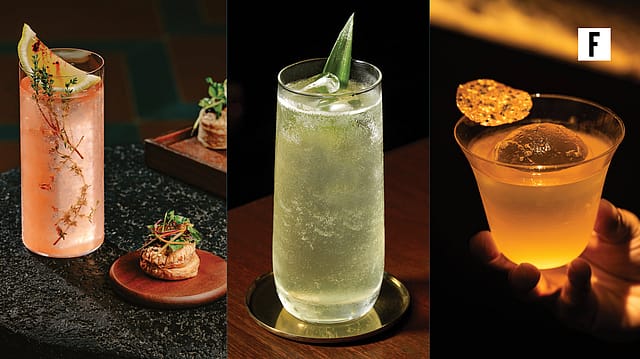Zero-proof, all craft: A ₹88-billion wave is redefining India’s beverage culture
ADVERTISEMENT

India’s restaurant industry is raising a toast—minus the alcohol. As the “sober-curious” movement gains traction, premium dining spaces across cities are rewriting their beverage playbooks with zero-proof cocktails that promise all the craft, balance, and complexity of a cocktail—without the buzz.
Industry estimates suggest India’s non-alcoholic beverage segment, spanning mocktails, zero-proof spirits, and artisanal sodas, will surge from $32 billion in 2025 to nearly $88 billion by 2027, registering a CAGR of 18–19%. Globally, the zero-proof trend has transformed from niche to mainstream.
According to IWSR Drinks Market Analysis, the no- and low-alcohol category grew by 31% in volume between 2020 and 2024, with forecasts suggesting a further +7% CAGR through 2028. The market is projected to hit $30 billion by 2025, the IWSR says, with the Asia-Pacific region contributing to over 40% of that growth.
Wellness-focused millennials and Gen Z diners, who see zero-proof drinks as part of an “experience-first” lifestyle rather than a restrictive one, are powering the movement in India. Mumbai’s top restaurants lead the charge. Burma Burma, The Bombay Canteen, O Pedro, and Bandra Born are redefining the alcohol-free experience with technique-driven menus that pair cultural ingredients with culinary storytelling. The result: a new category of drinks that are as inventive and indulgent as any classic cocktail.
October 2025
As India’s growth story gains momentum and the number of billionaires rises, the country’s luxury market is seeing a boom like never before, with the taste for luxury moving beyond the metros. From high-end watches and jewellery to lavish residences and luxurious holidays, Indians are splurging like never before. Storied luxury brands are rushing in to satiate this demand, often roping in Indian celebs as ambassadors.
Burma Burma, India’s only Burmese specialty restaurant chain, is at the forefront of the movement. Its outlet at Gourmet Village, Palladium Mall, Mumbai, has launched a zero-proof cocktail menu in collaboration with award-winning mixologist Avinash Kapoli. Drinks such as the umami-rich Laphet Lush and tropical Burma Sour use fermented tea leaves, jaggery, tamarind, kaffir lime, and other Burmese ingredients. Crafted with techniques like infusion, clarification, and slow extraction, each beverage mirrors the complexity of a cocktail—sans the alcohol. Prices range from ₹370 to ₹450.
Ankit Gupta, co-founder of Hunger Pangs Pvt. Ltd that owns Burma Burma, says the trend is rooted in both creativity and consciousness. “We wanted to go beyond the idea of mocktails being just sweet or one-dimensional. Our goal was to create a serious beverage programme that celebrates the same craft, balance, and presentation as a cocktail, but without the alcohol,” he says.
Gupta adds that the move reflects a broader “sober-curious” shift among diners: “We’re seeing a 25–30% increase in guests asking for non-alcoholic yet sophisticated drinks. The idea is no longer just abstaining—it’s about mindful drinking, where flavour, texture, and ritual matter as much as the spirit.”
At The Bombay Canteen and O Pedro, the Free-Spirited Cocktails menu embodies this balance. Yash Bhanage, founder & COO of Hunger Inc. Hospitality, explains: “At The Bombay Canteen and O Pedro, our drinks have always been about balance, flavour, and celebrating Indian ingredients, whether with or without alcohol. The idea behind introducing our free-spirited cocktails (or zero-proof cocktails) was born out of a simple but important thought: everyone who walks into our restaurants should be able to enjoy a complete and exciting drinking experience, regardless of whether they consume alcohol or not.”
He adds: “Too often, non-alcoholic options end up being an afterthought, a sugary mocktail or a virgin version of a cocktail, but to us, that’s not a well-balanced drink. Each free-spirited cocktail has been built from the ground up, using techniques like clarification, and homemade cordials, bitters, and sodas to make sure the drinks are flavour-forward, complex, and satisfying.”
These drinks, priced between ₹430 and ₹490, are part of a growing movement toward inclusive beverage menus that rival their boozy counterparts in creativity and flavour. Bhanage notes that across Hunger Inc.’s restaurants, zero-proof cocktails now account for nearly 12–15% of total beverage sales, compared to less than 5% pre-2023—a telling sign of India’s shifting drinking culture.
Bandra Born’s chef-partner Gresham Fernandes echoes this approach. “Zero-proof culture allows us to experiment with fermentation, spice, and creative techniques,” he says. “The magic lies in intent—when we replace a spirit with a herbal distillate or brine, we become more deliberate about texture, acidity, and aroma. It’s not a lesser option—it’s a parallel language for indulgence.”
At Bandra Born, zero-proof creations such as the Kokum Spritz and Fermented Pineapple Highball are emerging as bestsellers, accounting for nearly 20% of bar orders on weekends.
From pandan-infused gin blends and clarified watermelon coolers to smoky lapsang souchong teas served in coupe glasses, these beverages are turning dining into a multi-sensory ritual. And as Indian diners embrace mindful indulgence, zero-proof cocktails are no longer a compromise—they’re the new measure of creativity and sophistication.
Fortune India is now on WhatsApp! Get the latest updates from the world of business and economy delivered straight to your phone. Subscribe now.
